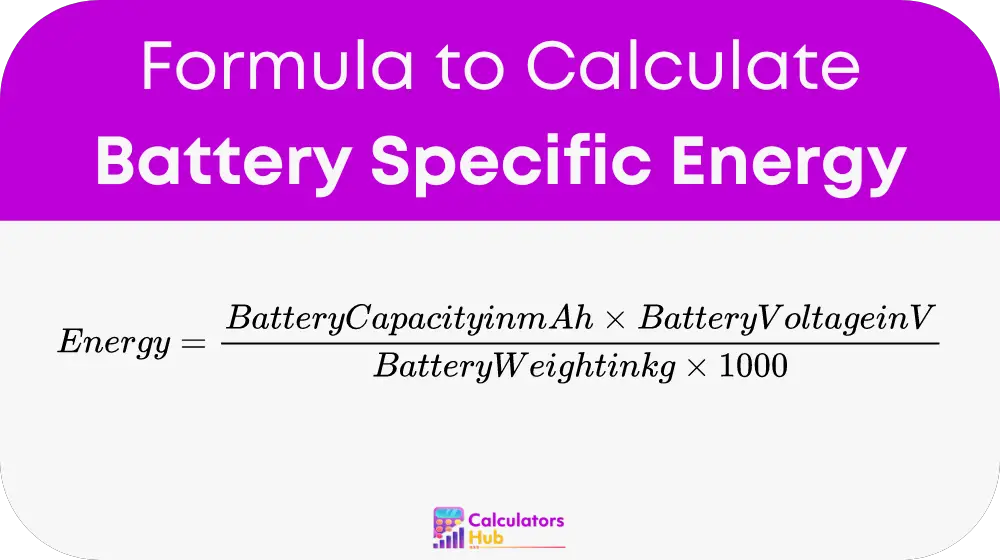The Battery Specific Energy Calculator allows users to determine the specific energy of a battery, expressed in watt-hours per kilogram (Wh/kg). This calculation helps in assessing how much energy a battery can provide per unit of weight, which is particularly important in industries such as automotive, aerospace, and portable electronics. By understanding specific energy, manufacturers and consumers can make informed decisions about battery selection, optimizing for both performance and efficiency.
Formula of Battery Specific Energy Calculator
The Battery Specific Energy Calculator uses the following formula to calculate specific energy:

Explanation:
- Battery Capacity in mAh: The total capacity of the battery, measured in milliampere-hours (mAh), indicates the amount of electric charge the battery can store.
- Battery Voltage in V: The nominal voltage of the battery, reflecting the potential difference it can provide.
- Battery Weight in kg: The total weight of the battery, measured in kilograms.
- 1000: The conversion factor to convert milliampere-hours (mAh) to watt-hours (Wh).
This formula calculates the specific energy, allowing users to compare batteries on the basis of energy efficiency relative to weight.
Table for General Terms
To provide a clearer understanding, here is a table of commonly searched terms related to battery specific energy:
| Term | Definition |
|---|---|
| Specific Energy (Wh/kg) | The amount of energy a battery can store per unit of weight, measured in watt-hours per kilogram. |
| Battery Capacity (mAh) | The total electric charge a battery can store, measured in milliampere-hours. |
| Battery Voltage (V) | The nominal voltage of the battery, indicating the electric potential difference. |
| Battery Weight (kg) | The total weight of the battery, measured in kilograms. |
| Watt-Hour (Wh) | A unit of energy equivalent to one watt of power expended for one hour. |
Example of Battery Specific Energy Calculator
Let’s consider a practical example to illustrate how the Battery Specific Energy Calculator works:
Scenario
You are evaluating a battery with the following specifications:
- Battery Capacity: 4000 mAh
- Battery Voltage: 3.7 V
- Battery Weight: 0.045 kg
Calculation
- Specific Energy = (4000 mAh * 3.7 V) / (0.045 kg * 1000) = 148 Wh/kg
This calculation indicates that the battery has a specific energy of 148 Wh/kg, which helps you understand how much energy the battery can deliver per kilogram of its weight. This information is crucial when selecting a battery for applications where weight and energy efficiency are critical, such as in drones, electric vehicles, or portable medical devices.
Most Common FAQs
Specific energy is crucial because it indicates how much energy a battery can provide relative to its weight. In applications where weight is a limiting factor, such as in electric vehicles or aerospace, higher specific energy means better performance and longer operational times without adding excessive weight.
Specific energy refers to the energy per unit of weight (Wh/kg), while energy density refers to the energy per unit of volume (Wh/L). Both are important metrics, but specific energy is particularly critical in applications where weight is a major concern.
Yes, advances in battery technology, such as the development of new materials and chemistries, can lead to improvements in specific energy, allowing batteries to store more energy per kilogram.